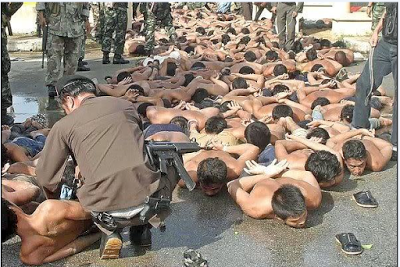The Thai military tortured to death a man in the troubled south and the Supreme Administrative Court accepted the facts awarding the man’s family US$28,000 compensation,
 It took eight years to get compensation but although the Internal Operations Security Command will have to pay out no action against the torturers has or will be taken.
It took eight years to get compensation but although the Internal Operations Security Command will have to pay out no action against the torturers has or will be taken.
This despite the court ruling that the rejecting the officers claims they could not be prosecuted because they were working under martial law and had the legal right therefore to beat 25-year-old Ahari Sama-ae.
The amount rather contrasts with the US$110 million sought by the Natural Fruit from Andy Hall, plus a seven year jail sentence, for libeling them by claiming the abuse of migrant workers rights in its pineapple canning factory in Prachuap Khiri-Kan.
 |
| Supinya |
The cases are different of course. One is about the value of human life and the second is about the reputation of a wealthy Thai and his fruit company and the commercial damages Andy Hall has inflicted on its reputation.
The first is straightforward. There was a body. There was evidence of beatings and a clear judgment.
The second, just as Thaksin Shinawatra’s Shin Corp tried to sue media rights campaigner Supinya Klangnarong for 400 million baht (US$112,000), is much more abstract.
The defence in this case could claim that most of the damage to Natural Fruit was self inflicted by their own attitude.
 The critical report of Natural Fruit was actually prepared and presented by ‘Finnwatch’ – Andy Hall was just one of the team. But Andy Hall could be found. Natural Fruit is not going to take Finnwatch to court in Helsinki or anywhere else for that matter.
The critical report of Natural Fruit was actually prepared and presented by ‘Finnwatch’ – Andy Hall was just one of the team. But Andy Hall could be found. Natural Fruit is not going to take Finnwatch to court in Helsinki or anywhere else for that matter.
And there will be no independent investigation of workers’ rights issues at Natural Fruit.
That’s how it works.
Supinya beat the Shin Corp by the way – but she is Thai.
No wonder Human Rights Watch are today highlighting the case of Ahari Sama-ae.
(New York, August 25, 2015) – A Thai court’s award of damages for the fatal torture of a Muslim detainee highlights the government’s failure to prosecute soldiers who commit grave abuses in Thailand’s troubled deep south border provinces, Human Rights Watch said today. The case is a critical test of Prime Minister Gen. Prayuth Chan-ocha’s vow to bring justice to Thailand’s restive southern border provinces.
On August 21, 2015, the Supreme Administrative Court ruled that Ashari Sama-ae, 25, died from injuries he sustained while detained by the Internal Security Operations Command (ISOC) in 2007. The court ordered the Prime Minister’s Office, which directs the ISOC, to provide approximately 1,014,000 baht (US$28,000) to Ashari’s family as compensation. However, authorities have not prosecuted any of the soldiers allegedly involved in the torture and killing of Ashari.
“The court ruling in the Ashari case confirms yet another deadly human rights abuse by troops in Thailand’s deep south,” said Brad Adams, Asia director at Human Rights Watch.
“The Thai government’s failure to bring to justice those responsible for Ashari’s torture and death is part of the broad pattern of abuse in which impunity is the norm.”
Soldiers from the 11th Task Force and the 13th Task Force arrested Ashari on July 21, 2007 during a security sweep in Yala province’s Krong Pi Nang district. That evening, they sent Ashari from Ingkhayuth Camp in Pattani province to Yala Regional Hospital for treatment of injuries.
He died the next morning. The autopsy report revealed swelling in Ashari’s brain and numerous bruises on his body. Other people arrested with Ashari later filed a complaint with the National Human Right Commission, alleging that they had been tortured in military custody.
Troops from regular and militia units in the southern border provinces carry a code-of-conduct booklet produced by ISOC that prohibits violations of human rights and due process of law. However, Human Rights Watch has interviewed many ethnic Malay Muslims in the southern border provinces who contended that they had been tortured or otherwise ill-treated by security personnel.
Lawyers and independent medical experts who have seen detainees during and after their release have corroborated these allegations. The most common forms of torture have been ear-slapping, punching, kicking, beating, electric shock, strangulation, and suffocation with plastic bags.
On September 12, 2014, General Prayuth announced at the National Legislative Assembly that his government would seek a solution to violence in the southern border provinces by “… creating trust and confidence in the judicial process based on the rule of law and human rights principles without discrimination.”
The International Covenant on Civil and Political Rights, to which Thailand is a party, prohibits arbitrary arrest and detention; torture and other cruel, inhuman, or degrading treatment; and extrajudicial execution. Thailand is also a party to the Convention against Torture and Other Cruel, Inhuman or Degrading Treatment or Punishment, which specifically places an obligation on governments to investigate and prosecute acts of torture and other ill-treatment.
Providing monetary compensation to the victims and their families does not free Thai authorities from their obligation to prosecute members of the security forces responsible for serious abuses, Human Rights Watch said.
The Thai government should:
Immediately ensure the safety of all detainees in the southern border provinces;
Provide urgent medical care to all who sustained injuries during arrest or in detention;
Allow timely access to legal counsel and family members; and
Open a full investigation into allegations of torture and ill-treatment.
Since a new surge of fighting in the southern border provinces began, Thai security forces have carried out killings, enforced disappearances, torture, and other abuses with impunity.
The Thai government has yet to prosecute successfully any security personnel for abuses against ethnic Malay Muslims alleged to be involved in the insurgency.
While the Pejuang Kemerdekaan Patani (Patani Freedom Fighters) – separatist insurgents in the loose network of BRN-Coordinate (National Revolution Front-Coordinate) – have suffered setbacks from counter-insurgency operations, they are still able to maintain their presence in hundreds of villages. The insurgents have committed numerous atrocities, including indiscriminate bombings and summary killings, against civilians from the ethnic Thai Buddhist and Malay Muslim communities. More than 6,000 people have been killed since fighting erupted in January 2004.
“No one doubts that the Thai government is fighting a brutal insurgency, but that does not justify giving a blank check to troops to commit abuses,” Adams said. “By relying on repressive measures and restrictions on fundamental human rights, Thai authorities have only helped create a fertile ground for further militancy and violence in the deep south.”




Acting like a third world country gets you labelled as such, then many Thai faces are lost as a result.
Signed,
The Domino Effect
Yes sir aussie dave, that and brag about their latest sexual conquests – with Thai women young enough to be their daughters, and in some case grand daughters even.
Christ I get tired of hearing those A holes brag about that stuff – like they think we'd be the slightest bit fk'ing envious.
Jeez our respective western embassies are piss weak. What the f@*k do they even do in Thailand? Hang around Soi 4 waiting for the next press conference?